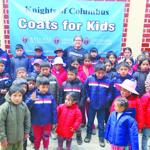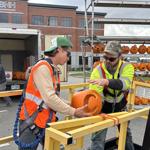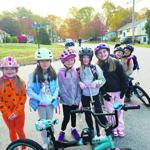LACONIA — As winter approaches and temperatures begin to drop, the Mayor’s Housing Task Force is reminding the community about essential fire safety practices, especially for those relying on outdoor heating sources. Additionally, during the December 5th meeting of the Public Health Advisory Council (PHAC), Nicole Fitts, Integrative & Bridge Program Lead at the Lakes Region Mental Health Center (LRMHC) presented critical updates about local resources, including the Laconia Warming Center at 24 McGrath St.
Warming center details
The Laconia Warming Center at 24 McGrath St. will operate with the following hours:
- Weekends: 8 a.m.-8 p.m.
- Monday through Friday: Weather-activated opening. The center will open if the temperature reaches 20°F or below, or if there are six inches of snow or more. If open, the center will operate from 4-7 p.m. on weekdays.
This winter shelter is a low-barrier facility and the hours have been coordinated between the Lakes Region Mental Health Center and Isaiah’s Shelter to ensure 24-hour weekend coverage. Due to the lack of warming shelters in Franklin, people in need will be directed to resources in Laconia or Concord.
DIY heating sources and safety tips
DIY heaters, campfires and other makeshift heating solutions such as propane stoves, candle-based heaters, or portable camp stoves can provide warmth but also carry significant fire and health risks if not used safely. For anyone experiencing homelessness, knowing how to manage these heating sources safely is critical to prevent accidents, burns, and other fire-related emergencies.
Propane tank safety: Store propane tanks in well-ventilated outdoor areas away from tents, structures, and any flammable materials, keeping them at least 10 feet away from open flames. Ensure the valve is fully closed when not in use by turning it clockwise until tight. Propane leaks smell like rotten eggs — if this is detected, immediately evacuate the area and seek assistance. Use propane tanks only in an upright position.
Candle heaters: If using candles to create a small heater, always secure them in fireproof containers, like a clay pot and keep them away from anything that could catch fire. Never leave candles unattended, and avoid placing them near sleeping areas or flammable items like blankets and sleeping bags. Always put out the candle before leaving the space or sleeping to reduce risks.
Campfires: Choose a location for campfires that is clear of branches, bushes, and other flammable materials in a 10-foot radius. Surrounding the fire with rocks can help contain it. Have an extinguisher, shovel, bucket of sand, or water nearby. Ensure the fire is completely out by dousing it with water, stirring the ashes, and checking for remaining heat, and never leave it unattended.
Burn and carbon monoxide prevention
DIY heating sources, especially those with flames, carry a high risk of burns and carbon monoxide poisoning, Carbon monoxide, a colorless, odorless gas, is produced when fuel burns in low-ventilation areas, and is especially dangerous in confined spaces and tents. To avoid CO poisoning, let air circulate when using any flame-based or fuel-powered heater, and if using a small generator, never place it indoors or close to sleeping areas to avoid harmful fumes.
Additional tips
Dispose of cigarettes properly: Use a butt bucket or fireproof container for cigarette disposal.
Check electrical equipment: Avoid using damaged equipment or frayed cords and keep them away from wet areas.
Fire escape preparedness: Have a clear plan for emergencies. Call 911 if a fire gets out of control, and be prepared to escape quickly. If in a tent, consider keeping a utility knife handy to cut an escape path if needed.
First aid for burns and frostbite
Should a burn or frostbite occur, immediate first aid is critical. For burns, place the affected area in clean, cool water for 3-5 minutes and cover with a dry cloth.
For frostbite, avoid rubbing the area and warm it gradually with dry clothing or blankets — never use direct heat. Seek medical help for severe injuries or signs of infection.
Support and resources
The Task Force, along with local shelters and service providers, is working to provide additional outreach, supplies, and education to ensure our community members stay as safe as possible.
If you or someone you know needs outreach support, call 211. In emergencies, always call 911.

















(0) comments
Welcome to the discussion.
Log In
Keep it Clean. Please avoid obscene, vulgar, lewd, racist or sexually-oriented language.
PLEASE TURN OFF YOUR CAPS LOCK.
Don't Threaten. Threats of harming another person will not be tolerated.
Be Truthful. Don't knowingly lie about anyone or anything.
Be Nice. No racism, sexism or any sort of -ism that is degrading to another person.
Be Proactive. Use the 'Report' link on each comment to let us know of abusive posts.
Share with Us. We'd love to hear eyewitness accounts, the history behind an article.